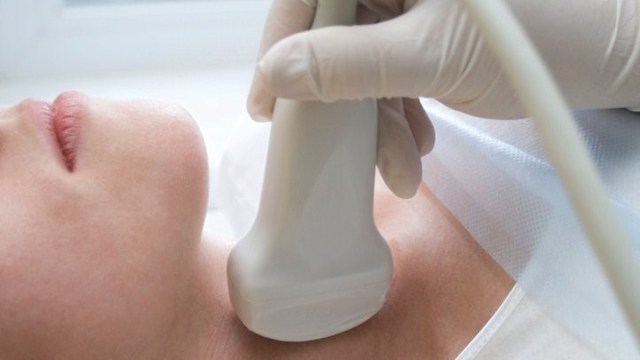Hypothyroidism
She walked slowly as if she didn't have any strength. Her eyes looked shallow and droopy as if she had been sleeping for a long time.
"What is wrong with you, haven't you been sleeping?" I asked her earnestly. I didn't understand whether she meant yes or no with the nod. I asked the same question again. This time noticing her brittled finger nails.
"I did sleep well, but I don't know why I feel too tired these days. I couldn't help but worry about her recent weight loss. Ever since I came to India, I have been watching her completely drained and depressed. She doesn't look like a new mom or a newly wed. The charm in her face that was there two years ago when she was married is gone along with the glow she had as when she was pregnant. Our next door neighbor looked like a real patient. Two days later she came out and explained that she was just diagnosed with 'Hypothyroidism'.
Hypothyroidism by definition means insufficient production of the thyroid hormones T4 and T3 which affects the metabolism, growth and development along with the cellular processes. Thyroid hormones are produced by the thyroid gland that is located in the neck area just below the adam's apply, surrounding the trachea or the windpipe. Thyroid gland produces the thyroid hormones using iodine from foods like bread, salt. T4 hormone is known as Thyroxine and T3 as Triiodothyroxine. Production of these hormones is regulated by the pituitary gland which in turn is regulated by the hypothalamus in the brain. All these in turn affect the metabolism of the cells in the body.
Hypothyroidism is more common in women then men and the chances increase with increase in age. There are different kinds of hypothyroidism such as:
1. Hashimotos Thyroiditis - is caused by the enlargement of the thyroid gland that reduces the gland's ability to produce the hormones. This condition is mostly genetic and runs in families. It is usually associated with the lack of Vitamin B-12 resulting in anemia. This condition is usually more common in women.
2. Lymphocytic - This condition usually follows hyperthyroidism which is caused by lymphocytes. This condition usually occurs in women after pregnancy and tends to regress after sometimes. In few cases it remains as it is and requires medications.
3. Thyroid Destruction - happens when hyperthyroidism is treated with radioactive iodine which leads to hypothyroidism or post surgery to remove the enlarged thyroid gland.
4. Pituitary disease - this condition is a result of the inability of the pituitary gland to send signals to the thyroid gland to produce the hormones or damage to the pitiutary gland.
5. Medications - medications containing large amounts of iodine or that are used to treat
hypothyroidism could cause hypothyroidism.
6. Severe iodine deficiency - in diets using salts that contain less or no iodine present such as breads can cause this condition. This is more common in countries like India and Chile etc....
Symptoms of Hypothyroidism include:
fatigue, depression, weight gain, cold intolerance, sleepiness, dry or coarse hair and skin, constipation, high levels of cholesterol, swollen legs or pain. Women usually experience heavy periods. In severe cases puffiness around the eyes, slowing heartbeat, lower body temperature and heart failure among others could result. In extreme cases this condition to lead to coma.
Treatments are available for hypothyroidism through hormone replacement therapy. If untreated this condition could lead to heart failure, enlarged heart or pleural effusion. Diagnosis should start with a thorough blood work for hormone levels. Hypothyroidism requires medications for life. The most common medication for this condition is Levothyroxine. Treatment with drugs should be monitored very closely as excessive medicines could lead to palpitations, osteoporosis sometimes.
As with conditions such diabetes or high blood pressure exercise is very important for people with hypothyroidism.
Some of the food products include: 1. whole wheat breads, bran, onions, tomatoes, broccoli, Selenium products, carrots, spinach, apricots, asparagus, olive oil, avocado, sunflower seeds, whole grain cereals, bananas, fish containing oils. People with this conditions should use less cabbage, mustard, peanuts, sweet potatoes. They should avoid coffees, teas, sodas and stress. 4 mg of iodine along with 600 units of Vitamin E is recommended for patients with Hypothyroidism. The use of Zinc in diets is said to improve the thyroid function. As far as our neighbor is concerned her condition turned out to be heredity and she is put on medication for life. People with hypothyroidism should be treated with the same care and concern as with any other diseases such as diabetes and hypertension because, 'OUR LIFE MATTERS'.





Add a Comment2 Comments
Thank you so much for this article. This is the first article I have found that list good/bad food choices as well as vitamins that would be benificial.
Harleynonna
July 28, 2010 - 7:04amThis Comment
PLEASE BEWARE: If you have Hashimoto's Disease, thyroid hormone supplement may not be the best approach and iodine supplement can make it worse. Have extra testing done for Hashimoto's disease if you're diagnosed with hypothyroidism.
July 8, 2010 - 7:47amThis Comment